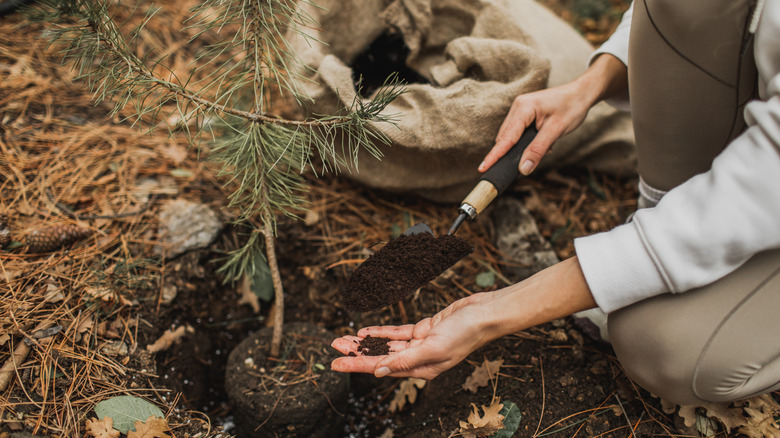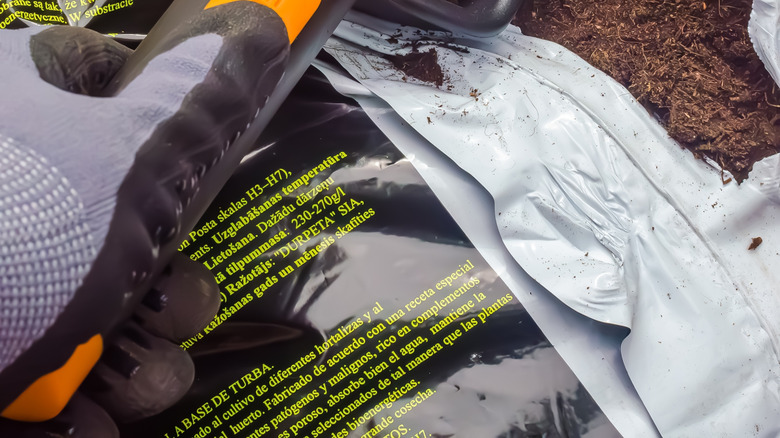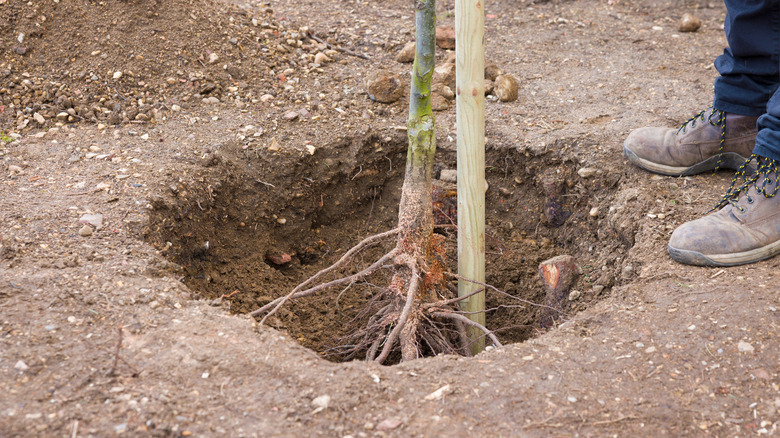Planting A Tree? Be Careful About Using Compost
When it's time to prep your yard's soil for planting a tree, grabbing some compost may seem like an obvious step. Compost has tons of benefits for plants, from improving soil structure to boosting moisture retention, and it's long been considered standard procedure to add it to the soil when tree planting. But horticulture experts now say this is a myth, and research has shown no benefit to it. In some cases, it's simply a waste of time; in others, it can harm your tree long-term.
Conventional wisdom said to add compost or another form of organic matter to your "backfill," or the soil that you use to refill the planting hole after placing the young tree inside. Everyone from tree nursery pros to landscapers have long recommended this technique, and many still do. Adding around 10% to 20% compost is typically advised.
But while amending soil is helpful in container gardens, it's not ideal for planting trees in the ground. It can damage root health and stunt your tree's growth, and trees typically grow just fine in unamended soil as long as you select the right species for your soil type and location. There are other, more effective ways to give trees a healthy kickstart than adding compost.
What compost can do to your tree
One reason not to add compost to your backfill or planting hole is that the benefits won't last. Best-case scenario, the tree's roots will quickly grow past the initial hole where the compost is located, making it a waste of time and money. The worst-case scenario is actually the opposite: The tree's roots may have a hard time spreading past that initial hole into the surrounding native soil, resulting in stunted growth. This can occur because the amended soil has a different consistency and nutritional content than the soil around it. The roots tend to naturally stay confined in the planting hole where there are more nutrients and more aeration. Depending on the texture of the amended soil, the planting hole may either hold onto too much water, suffocating or rotting the roots, or not enough water, causing water stress.
There are other potential problems with adding compost to tree planting holes. It can cause nitrogen immobilization, in which nitrogen becomes less available to the tree's roots. And it can introduce weeds or diseases. Rather than amending the soil, focus on choosing the right tree that can thrive in your soil's conditions. In the rare cases when your soil is truly unsuitable for any tree growth, replacing all of the soil is the solution, instead of adding compost.
Water is the best amendment
Prepping your soil before planting can still be helpful, particularly if the soil is compacted. Loosen or break up the soil first to improve drainage and aeration. Aside from that, planting at the right depth is the most important step for healthy tree growth. Many people plant trees too deep, so the young roots have trouble accessing oxygen; this can limit growth or even kill the tree. Rather than basing the depth on the root ball, aim to keep the trunk flare — where the root widens at the base, also known as the root collar — just above the surface of the soil. In sandy, well-draining soils, aim for the trunk flare to be 1 to 2 inches above the surface; in heavy clay soils, aim for 2 to 3 inches. The width of the planting hole also matters: two to three times the root ball's width is ideal for healthy root growth, less compaction, and more aeration.
Next, mulch the soil surface with fresh wood chips — nothing composted. This ensures that nutrients are slowly incorporated into the soil. If you like, you can add a slow-release fertilizer on top of the mulch, but this is usually not necessary and comes with its own risks.
As far as "amendments" go, water is truly all your new tree needs. Water lightly every day in the first week, every other day in the second week, every third day in the third week, and so on until you get to once a week. To avoid over-watering, check that the soil is warm and dry to the touch before watering more.


